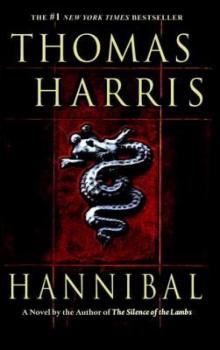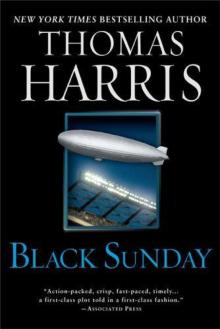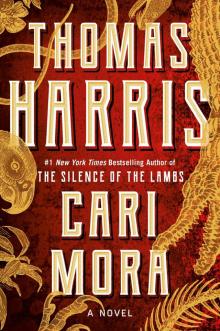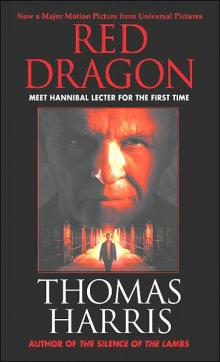- Home
- Thomas Harris
Red Dragon hl-1 Page 28
Red Dragon hl-1 Read online
Page 28
* * *
A junior high school band was getting on the bus in the motel parking lot. The children saw Dolarhyde coming. He had to go through them to get to his van.
A fat, round-faced boy with his Sam Browne belt all crooked put on a scowl, puffed up his chest and flexed his biceps after Dolarhyde passed. Two girls giggled. The tuba blatted out the bus window as Dolarhyde went by, and he never heard the laughter behind him.
In twenty minutes he stopped the van in the lane three hundred yards from Grandmother’s house.
He mopped his face, inhaled deeply three or four times. He gripped his house key in his left hand, the steering wheel with his right.
A high keening sounded through his nose. And again, louder. Louder, louder again. Go.
Gravel showered behind the van as it shot forward, the house bouncing bigger in the windshield. The van slid sideways into the yard and Dolarhyde was out of it, running.
Inside, not looking left or right, pounding down the basement stairs, fumbling at the padlocked trunk in the basement, looking at his keys.
The trunk keys were upstairs. He didn’t give himself time to think. A high humming through his nose as loud as he could to numb thought, drown out voices as he climbed the stairs at a run.
At the bureau now, fumbling in the drawer for the keys, not looking at the picture of the Dragon at the foot of the bed.
“WHAT ARE YOU DOING?”
Where were the keys, where were the keys?
“WHAT ARE YOU DOING? STOP. I’VE NEVER SEEN A CHILD AS DISGUSTING AND DIRTY AS YOU. STOP.”
His searching hands slowed.
“LOOK… LOOK AT ME.”
He gripped the edge of the bureau—tried not to turn to the wall. He cut his eyes painfully away as his head turned in spite of him.
“WHAT ARE YOU DOING?”
“nothing.”
The telephone was ringing, telephone ringing, telephone ringing. He picked it up, his back to the picture.
“Hey, D., how are you feeling?” Reba MeClane’s voice.
He cleared his throat. “Okay”—hardly a whisper.
“I tried to call you down here. Your office said you were sick—you sound terrible.”
“Talk to me.”
“Of course I’ll talk to you. What do you think I called you for? What’s wrong?”
“Flu,” he said.
“Are you going to the doctor?.. Hello? I said, are you going to the doctor?”
“Talk loud.” He scrabbled in the drawer, tried the drawer next to it.
“Have we got a bad connection? D., you shouldn’t be there sick by yourself.”
“TELL HER TO COME OVER TONIGHT AND TAKE CARE OF YOU.”
Dolarhyde almost got his hand over the mouthpiece in time.
“My God, what was that? Is somebody with you?”
“The radio, I grabbed the wrong knob.”
“Hey, D., do you want me to send somebody? You don’t sound so hot. I’ll come myself. I’ll get Marcia to bring me at lunch.”
“No.” The keys were under a belt coiled in the drawer. He had them now. He backed into the hall, carrying the telephone. “I’m okay. I’ll see you soon.” The /s/s nearly foundered him. He ran down the stairs. The phone cord jerked out of the wall and the telephone tumbled down the stafrs behind him.
A scream of savage rage. “COME HERE CUNT FACE.”
Down to the basement. In the trunk beside his case of dynamite was a small valise packed with cash, credit cards and driver’s licenses in various names, his pistol, knife, and blackjack.
He grabbed the valise and ran up to the ground floor, quickly past the stairs, ready to fight if the Dragon came down them. Into the van and driving hard, fishtailing in the gravel lane.
He slowed on the highway and pulled over to the shoulder to heave yellow bile. Some of the fear went away.
Proceeding at legal speed, using his flashers well ahead of turns, carefully he drove to the airport.
Chapter 39
Dolarhyde paid his taxi fare in front of an apartment house onEastern Parkwaytwo blocks from theBrooklynMuseum. He walked the rest of the way. Joggers passed him, heading forProspectPark. Standing on the traffic island near the IRT subway station, he got a good view of the Greek Revival building. He had never seen theBrooklynMuseumbefore, though he had read its guidebook—he had ordered the book when he first saw “BrooklynMuseum” in tiny letters beneath photographs of The Great Red Dragon and the Woman Clothed with the Sun.
The names of the great thinkers from Confucius to Demosthenes were carved in stone above the entrance. It was an imposing building with botanical gardens beside it, a fitting house for the Dragon.
The subway rumbled beneath the street, tingling the soles of his feet. Stale air puffed from the gratings and mixed with the smell of the dye in his mustache.
Only an hour left before closing time. He crossed the street and went inside. The checkroom attendant took his valise.
“Will the checkroom be open tomorrow?” he asked.
“The museum’s closed tomorrow.” The attendant was a wizened woman in a blue smock. She turned away from him.
“The people who come in tomorrow, do they use the checkroom?”
“No. The museum’s closed, the checkroom’s closed.”
Good. “Thank you.”
“Don’t mention it.”
Dolarhyde cruised among the great glass cases in the Oceanic Hall and the Hall of theAmericason the ground floor—Andespottery, primitive edged weapons, artifacts and powerful masks ftom the Indians of the Northwest coast.
Now there were only forty minutes left before the museum closed. There was no more time to learn the ground floor. He knew where the exits and the public elevators were.
He rode up to the fifth floor. He could feel that he was closer to the Dragon now, but it was all right—he wouldn’t turn a corner and run into Him.
The Dragon was not on public display; the painting had been locked away in the dark since its return from the Tate Gallery inLondon.
Dolarhyde had learned on the telephone that The Great Red Dragon and the Woman Clothed with the Sun was rarely displayed. It was almost two hundred years old and a watercolor—light would fade it.
Dolarhyde stopped in front of Albert Bierstadt’s A Storm in the Rocky Mountains—Mt. Rosalie 1866 . From there he could see the locked doors of the Painting Study and Storage Department. That’s where the Dragon was. Not a copy, not a photograph: the Dragon. This is where he would come tomorrow when he had his appointment.
He walked around the perimeter of the fifth floor, past the corridor of portraits, seeing nothing of the paintings. The exits were what interested him. He found the fire exits and the main stairs, and marked the location of the public elevators.
The guards were polite middle-aged men in thick-soled shoes, years of standing in the set of their legs. None was armed, Dolarhyde noted; one of the guards in the lobby was armed. Maybe he was a moonlighting cop.
The announcement of closing time came over the public-address system.
Dolarhyde stood on the pavement under the allegorical figure ofBrooklynand watched the crowd come out into the pleasant summer evening.
Joggers ran in place, waiting while the stream of people crossed the sidewalk toward the subway.
Dolarhyde spent a few minutes in the botanical gardens. Then he flagged a taxi and gave the driver the address of a store he had found in the Yellow Pages.
Chapter 40
At nine P.M. Monday Graham set his briefcase on the floor outside theChicagoapartment he was using and rooted in his pocket for the keys.
He had spent a long day inDetroitinterviewing staff and checking employment records at a hospital where Mrs. Jacobi did volunteer work before the family moved toBirmingham. He was looking for a drifter, someone who might have worked in bothDetroitandAtlantaor inBirminghamandAtlanta; someone with access to a van and a wheelchair who saw Mrs. Jacobi and Mrs. Leeds before he broke into their houses.
>
Crawford thought the trip was a waste of time, but humored him. Crawford had been right. Damn Crawford. He was right too much.
Graham could hear the telephone ringing in the apartment. The keys caught in the lining of his pocket. When he jerked them out, a long thread came with them. Change spilled down the inside of the trouser leg and scattered on the floor.
“Son of a bitch.”
He made it halfway across the room before the phone stopped ringing. Maybe that was Molly trying to reach him.
He called her inOregon.
Willy’s grandfather answered the telephone with his mouth full. It was suppertime inOregon.
“Just ask Molly to call me when she’s finished,” Graham told him. He was in the shower with shampoo in his eyes when the telephone rang again. He sluiced his head and went dripping to grab the receiver. “Hello, Hotlips.”
“You silver-tongued devil, this is Byron Metcalf inBirmingham.”
“Sorry.”
“I’ve got good news and bad news. You were right about Niles Jacobi. He took the stuff out of the house. He’d gotten rid of it, but I squeezed him with some hash that was in his room and he owned up. That’s the bad news—I know you hoped the Tooth Fairy stole it and fenced it.
“The good news is there’s some film. I don’t have it yet.Nilessays there are two reels stuffed under the seat in his car. You still want it, right?”
“Sure, sure I do.”
“Well, his intimate friend Randy’s using the car and we haven’t caught up with him yet, but it won’t be long. Want me to put the film on the first plane toChicagoand call you when it’s coming?”
“Please do. That’s good, Byron, thanks.”
“Nothing to it.”
Molly called just as Graham was drifting off to sleep. After they assured each other that they were all right, there didn’t seem to be much to say.
Willy was having a real good time, Molly said. She let Willy say good night.
Willy had plenty more to say than just good night—he told Will the exciting news: Grandpa bought him a pony.
Molly hadn’t mentioned it.
Chapter 41
TheBrooklynMuseumis closed to the general public on Tuesdays, but art classes and researchers are admitted.
The museum is an excellent facility for serious scholarship. The staff members are knowledgeable and accommodating; often they allow researchers to come by appointment on Tuesdays to see items not on public display.
Francis Dolarhyde came out of the IRT subway station shortly after 2 P.M. on Tuesday carrying his scholarly materials. He had a notebook, a Tate Gallery catalog, and a biography of William Blake under his arm.
He had a flat 9-mm pistol, a leather sap and his razor-edged fileting knife under his shirt. An elastic bandage held the weapons against his flat belly. His sport coat would button over them. A cloth soaked in chloroform and sealed in a plastic bag was in his coat pocket.
In his hand he carried a new guitar case.
Three pay telephones stand near the subway exit in the center ofEastern Parkway. One of the telephones has been ripped out. One of the others works.
Dolarhyde fed it quarters until Reba said, “Hello.”
He could hear darkroom noises over her voice.
“Hello, Reba,” he said.
“Hey, D. How’re you feeling?”
Traffic passing on both sides made it hard for him to hear. “Okay.”
“Sounds like you’re at a pay phone. I thought you were home sick.”
“I want to talk to you later.”
“Okay. Call me late, all right?”
“I need to… see you.”
“I want you to see me, but I can’t tonight. I have to work. Will you call me?”
“Yeah. If nothing…”
“Excuse me?”
“I’ll call.”
“I do want you to come soon, D.”
“Yeah. Good-bye… Reba.”
All right. Fear trickled from his breastbone to his belly. He squeezed it and crossed the street.
Entrance to theBrooklynMuseumon Tuesdays is through a single door on the extreme right. Dolarhyde went in behind four art students. The students piled their knapsacks and satchels against the wall and got out their passes. The guard behind the desk checked them.
He came to Dolarhyde.
“Do you have an appointment?”
Dolarhyde nodded. “Painting Study, Miss Harper.”
“Sign the register, please.” The guard offered a pen. Dolarhyde had his own pen ready. He sigued “Paul Crane.” The guard dialed an upstairs extension. Dolarhyde turned his back to the desk and studied Robert Blum’s Vintage Festival over the entrance while the guard confirmed his appointment. From the comer of his eye he could see one more security guard in the lobby. Yes, that was the one with the gun.
“Back of the lobby by the shop there’s a bench next to the main elevators,” the desk officer said. “Wait there. Miss Harper’s coming down for you.” He handed Dolarhyde a pink-on-white plastic badge.
“Okay if I leave my guitar here?”
“I’ll keep an eye on it.”
The museum was different with the lights turned down. There was twilight among the great glass cases.
Dolarhyde waited on the bench for three minutes before Miss Harper got off the public elevator.
“Mr. Crane? I’m Paula Harper.”
She was younger than she had sounded on the telephone when he called fromSt. Louis; a sensible-looking woman, severely pretty. She wore her blouse and skirt like a uniform.
“You called about the Blake watercolor,” she said. “Let’s go upstairs and I’ll show it to you. We’ll take the staff elevator—this way.”
She led him past the dark museum shop and through a small room lined with primitive weapons. He looked around fast to keep his bearings. In the corner of theAmericassection was a corridor which led to the small elevator.
Miss Harper pushed the button. She hugged her elbows and waited. The clear blue eyes fell on the pass, pink on white, clipped to Dolarhyde’s lapel.
“That’s a sixth-floor pass he gave you,” she said. “It doesn’t matter—there aren’t any guards on five today. What kind of research are you doing?”
Dolarhyde had made it on smiles and nods until now. “A paper on Butts,” he said.
“On William Butts?”
He nodded.
“I’ve never read much on him. You only see him in footnotes as a patron of Blake’s. Is he interesting?”
“I’m just beginning. I’ll have to go toEngland.”
“I think the National Gallery has two watercolors he did for Butts. Have you seen them yet?”
“Not yet.”
“Better write ahead of time.”
He nodded. The elevator came.
Fifth floor. He was tingling a little, but he had blood in his arms and legs. Soon it would be just yes or no. If it went wrong, he wouldn’t let them take him.
She led him down the corridor of American portraits. This wasn’t the way he came before. He could tell where he was. It was all right.
But something waited in the corridor for him, and when he saw it he stopped dead still.
Paula Harper realized he wasn’t following and turned around. He was rigid before a niche in the wall of portraits. She came back to him and saw what he was staring at. “That’s a Gilbert Stuart portrait of George Washington,” she said.
No it wasn’t.
“You see a similar one on the dollar bill. They call it a Lansdowne portrait because Stuart did one for the Marquis of Lansdowne to thank him for his support in the American Revolution… Are you all right, Mr. Crane?”
Dolarhyde was pale. This was worse than all the dollar bills he had ever seen.Washingtonwith his hooded eyes and bad false teeth stared out of the frame. My God he looked like Grandmother. Dolarhyde felt like a child with a rubber knife.
“Mr. Crane, are you okay?”
Answer or blow it all. Get p
ast this. My God, man, that’s so sweeeet . YOU’RE THE DIRTIEST…No.
Say something.
“I’m taking cobalt,” he said. “Would you like to sit down for a few minutes?” There was a faint medicinal smell about him.
“No. Go ahead. I’m coming.”
And you are not going to cut me, Grandmother. God damn you, I’d kill you if you weren’t already dead. Already dead. Already dead. Grandmother was already dead! Dead now, dead for always. My God, man, that’s so sweeeet.
The other wasn’t dead though, and Dolarhyde knew it
He followed Miss Harper through thickets of fear.
They went through double doors into the Painting Study and Storage Department. Dolarhyde looked around qulckly. It was a long, peaceful room, well-lighted and filled with carousel racks of draped paintings. A row of small office cubicles was partitioned off along the wall. The door to the cubicle on the far end was ajar, and he heard typing.
He saw no one but Paula Harper.
She took him to a counter-height work table and brought him a stool.
“Wait here. I’ll bring the painting to you.”
She disappeared behind the racks.
Dolarhyde undid a button at his belly.
Miss Harper was coming. She carried a flat black case no bigger than a briefcase. It was in there. How did she have the strength to carry the picture? He had never thought of it as flat. He had seen the dimensions in the catalogs—17 1/8 by 13 1/2 inches—but he had paid no attention to them. He expected it to be immense. But it was small. It was small and it was here in a quiet room. He had never realized how much strength the Dragon drew from the old house in the orchard.
Miss Harper was saying something “…have to keep it in this solander box because light will fade it. That’s why it’s not on display very often.”
She put the case on the table and unclasped it. A noise at the double doors. “Excuse me, I have to get the door for Julio.” She refastened the case and carried it with her to the glass doors. A man with a wheeled dolly waited outside. She held the doors open while he rolled it in.

 The Silence of the Lambs
The Silence of the Lambs Red Dragon
Red Dragon Hannibal
Hannibal Black Sunday
Black Sunday Cari Mora
Cari Mora Hannibal Rising
Hannibal Rising Red Dragon hl-1
Red Dragon hl-1 The Silence of the Lambs (Hannibal Lecter)
The Silence of the Lambs (Hannibal Lecter)